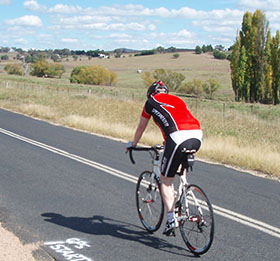* Research shows high-intensity exercise by middle-aged men in the early evening does not negatively affect subsequent sleep
* Findings suggest evening exercise may also reduce feelings of hunger
* Indicates early evening as a viable time-of day for high-intensity exercise
 Research at Charles Sturt University (CSU) has found that exercising in the evening will not ruin sleep and might even reduce appetite.
Research at Charles Sturt University (CSU) has found that exercising in the evening will not ruin sleep and might even reduce appetite.
The new research published in the UK journal Experimental Physiology by Ms Penny Larsen (et al), a PhD student in the CSU School of Exercise Science, Health and Sport in Bathurst.
Her study suggests that 30 minutes of high-intensity exercise performed in the early evening does not negatively affect subsequent sleep, and may also reduce feelings of hunger.
“With growing demands on our time, many middle-aged adults are finding time to engage in exercise increasingly difficult,” lead author Ms Larsen (pictured) said.
“For many, even the thought of fitting exercise in after a busy day at work can be as tiring as it is unappetising. The commonly held belief that high-intensity exercise should be avoided in the early evening due to its effect on sleep only serves to act as another barrier to exercise at this time.”
The CSU study recruited eleven middle-aged men to complete three experimental trials to investigate sleep and appetite responses to exercise performed in the morning (between 6am and 7 am), afternoon (2pm and 4 pm) and evening (7pm and 9 pm).
Participants were required to perform high-intensity cycling involving six one-minute, maximal intensity sprints interspersed by four minutes of rest. Blood collections were taken prior to exercise and following exercise to examine appetite-related hormones, and multiple tests were performed during sleep to assess sleep stages.
Ms Larsen said, “The results not only showed that evening exercise did not have a detrimental impact on subsequent sleep, but also that afternoon and evening high-intensity exercise were associated with greater reductions of the hunger stimulating hormone, ghrelin.
 “It is important to note that a single bout of exercise was not linked to reduced hunger, but nevertheless, the observations from this study support high-intensity exercise early in the evening as a viable time-of day for exercise.”
“It is important to note that a single bout of exercise was not linked to reduced hunger, but nevertheless, the observations from this study support high-intensity exercise early in the evening as a viable time-of day for exercise.”
Ms Larsen cautioned that as this study’s sample size was relatively small, the findings extrapolated to other population groups beyond middle-aged men may be limited, given that sleep and appetite regulation are influenced by gender and age.
“In the future, we hope to conduct similar studies recruiting women, to determine whether sleep and appetite responses may be different depending on gender,” Ms Larsen said.
“Also, this study only considered a single bout of exercise; therefore, it would be beneficial to investigate long-term sleep and appetite adaptations to high-intensity exercise training performed either in the morning, afternoon or evening.
“Interestingly, power output during the sprint efforts was higher for the afternoon and evening trials compared to the morning trial, indicating that participants were able to perform better during latter parts of the day. Therefore, time-of-day may also need to be considered when planning training schedules.”
The research article ‘Evening high-intensity interval exercise does not disrupt sleep or alter energy intake despite changes in acylated ghrelin in middle-aged men’ was published by the Physiological Society in the UK in Experimental Physiology.





Social
Explore the world of social